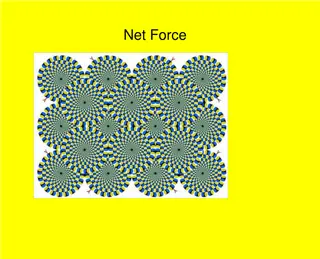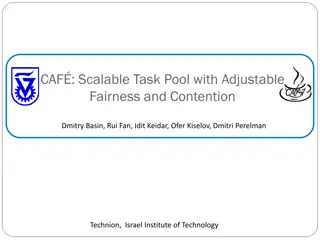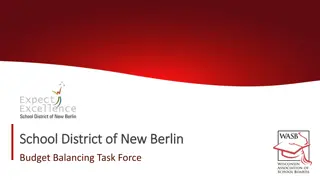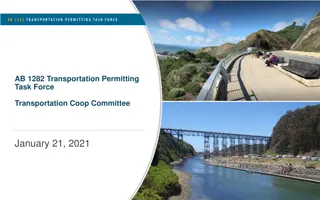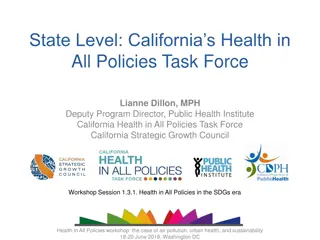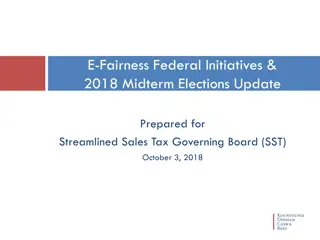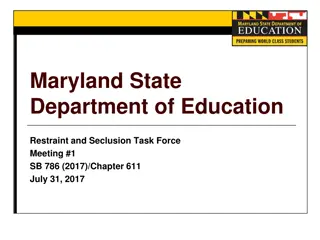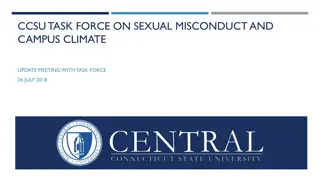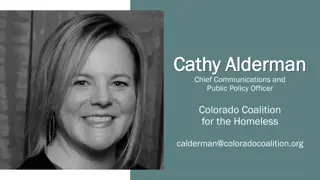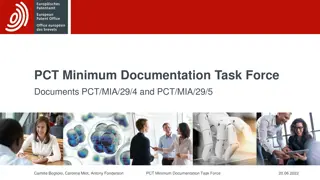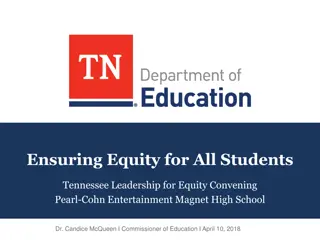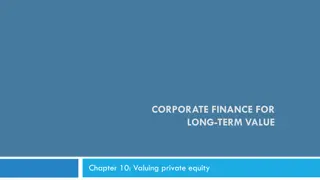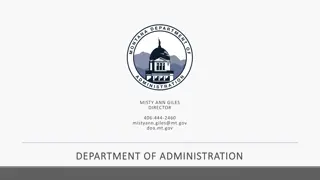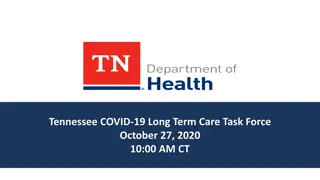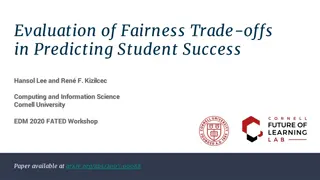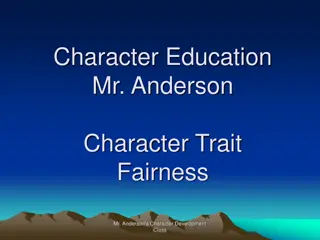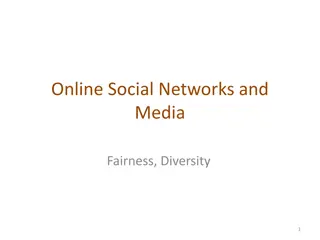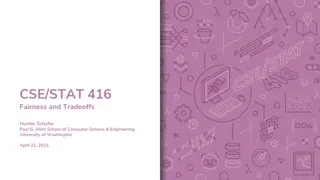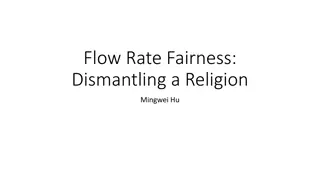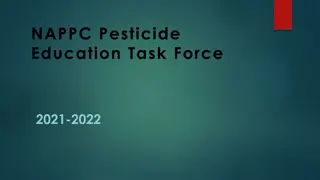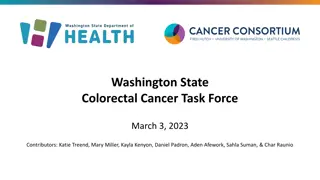Fairness and Equity in Assessment Task Force Meeting Overview
The Fairness and Equity in Assessment Task Force is committed to establishing guidelines to ensure fairness in assessment processes at the University of Florida. The task force members are tasked with developing models and guidelines for faculty and staff to promote equitable assessment practices. Responsibilities include attending meetings, contributing expertise, and communicating progress. The goal is to eliminate biases based on characteristics such as race, ethnicity, gender, or disability in assessment procedures.
Download Presentation

Please find below an Image/Link to download the presentation.
The content on the website is provided AS IS for your information and personal use only. It may not be sold, licensed, or shared on other websites without obtaining consent from the author. Download presentation by click this link. If you encounter any issues during the download, it is possible that the publisher has removed the file from their server.
E N D
Presentation Transcript
Fairness and Equity in Assessment Task Force Initial Meeting January 22, 2021 9am-10am -Virtual meeting -Zoom
Greetings and Introductions Website: https://assessment.aa.ufl.edu/ The Charge to the Task Force The Groups: Guideline Development and Model Development Agenda Getting started: Presentations from the Chairs Next Steps
The Task Force is charged with establishing a set of guidelines for UF faculty, instructors, staff, and administrators to help ensure fairness and equity in assessment in all contexts at the university. The guidelines must address fairness and equity in the entire assessment process, including development, opportunity to learn, administration, scoring, score interpretations, and the evaluation of the measurement properties of the assessment. The Charge
Attend scheduled Task Force meetings. Contribute expertise to the proceedings and the development of the guidelines and models. Task Force Responsibilities Communicate Task Force progress to your unit when appropriate.
Definition Fairness and equity in assessment refer to the process of measurement (e.g., through surveys, batteries, scales, rubrics, tests) such that the interpretations and uses of scores are based on the construct, indicator, or learning outcomes being measured and not the characteristics of the examinee (e.g., race, ethnicity, gender, or disability). Fairness and equity in assessment ensure that no examinees are disadvantaged based on these characteristics.
Guideline Development Group Work with David Miller and Teresa Mutahi to develop the guidelines and review the recommendations from the model development group, and where mutually agreeable, implement the recommendations to modify the guidelines. The Groups Model Development Group Work with Corinne Huggins-Manley to locate and develop models that operationalize the guidelines in various contexts; provide the guideline development group with modifications to increase their utility.
David Miller, Co-chair Professor, Research Evaluation and Methodology College of Education
ManyResources Available Professional Standards Books Articles Reports Experiences
ProfessionalStandards Standards for Educational and Psychological Testing (2014). American Educational Research Association (AERA), American Psychological Association (APA), and National Council on Measurement in Education (NCME). Code of Fair Testing Practices in Education(2004). Joint Committee on Testing Practices ( American Counseling Association, AERA, APA, American Speech- Language-Hearing Association, National Association of School Psychologists, National Association of Test Directors, and NCME.
Critical Areas of the Code of Fair Testing Practices in Education A. Developing and Selecting Appropriate Tests B. Administering and Scoring Tests C. Reporting and Interpreting Test Results D. Informing Test Takers
Corinne Huggins- Manley, Co-chair Associate Professor, Research and Evaluation Methodology College of Education
Measurement Validity, Fairness, and Equity (In a Nutshell)
Validity as a Unified Concept Definition: The degree to which evidence and theory support the interpretations of test scores entailed by proposed uses of tests. (Standards for Educational and Psychological Testing, p. 9) The test or instrument is not to be validated; the interpretations (and uses) are to be validated Evidence of validity comes from multiple sources, but that does not mean that there are multiple types of validity Validity is a matter of degree, not all or none The central issue is appraisal of the meaning and consequences of measurement
Definition: The process of measurement (e.g., through surveys, batteries, scales, rubrics, tests) such that the interpretations and uses of scores are based on the construct, indicator, or learning outcomes being measured and not the characteristics of the examinee (e.g., race, ethnicity, gender, or disability). Fairness and equity in assessment ensure that no examinees are disadvantaged based on these characteristics. Fairness and Equity in Assessment (UF Fairness and Equity in Assessment Task Force, 2021)
There are Many Examples of Evaluating Measurement Fairness
There are Many Examples of Evaluating Measurement Fairness
There are Many Examples of Evaluating Measurement Fairness
Teresa Mutahi, Co-chair Senior Lecturer & Biology Major Undergraduate Coordinator
Where are we? What guidelines/policies exist? Are there fairness and equity issues in assessments that we should address? Status of Fairness and Equity in assessments at UF Are there strengths indicative of fairness and equity in assessments that could be replicated across UF? Developing Assessment tools Administering Assessments Informing examinees Reporting and Interpreting Scores Use and Evaluation of Assessments
Examination of UFs Status on Fairness & Equity in Assessments Guidelines Development Group Model Development Group Faculty/College/Unit representatives Student Representatives Administrators/UFHR Library Graduate School Division of Student Affairs Assessment and Research
Assessment tools Systems Are our assessment systems inclusive, fair and equitable for all faculty, staff and student populations? Processes Methods Methods that reflect inherent biases are also much less likely to be detected by assessment teams unless they include diverse faculty and staff (Huston C., 2020) Scrutinize UF s Fairness & Equity Gaps/ Issues/Strengths
Guidelines Policies- individuals, programs & institution Practices Are our current assessment practices open and inclusive of faculty, staff or student populations? (Huston C., 2020). Non-science faculty added the practice of student-centered assessment (peer assessment, competency-based grading, opportunity to submit multiple drafts) compared to exams while science faculty did not (Yanowitz & Hahs-Vaughn (2007). Scrutinize UF s Fairness and Equity Gaps/ Issues/Strengths
Status of Fairness and Equity in Assessments at Practices Experiences Literature Case Studies Models Identify Gaps/issues and strengths UF
Fairness & Equity Gaps/Issues & Strengths Survey https://ufl.qualtrics.com/jfe/form/SV_9NBYvAYioRqqDSC
Huston, C. (2020).Strategies for Change: Equity in Assessment Practices. Urbana, IL: National Institute for Learning Outcomes Assessment, Council for the Advancement of Standards in Higher Education, and Campus Labs. Retrieved January 20th 2020 from http://www.learningoutcomesassessment.org/ Karen L. Yanowitz & Debbie L. Hahs-Vaughn (2007).Changes in student-centered assessment by postsecondary science and non-science faculty, Teaching in Higher Education, 12:2, 171-184, DOI: 10.1080/13562510701191927 References
Next Steps You will receive the survey via email, please complete it and submit it as soon as possible You will receive a doodle poll soon requesting your availability for bi-weekly meetings by group we will ask you to identify times you are open The chairs will contact you about the first meeting time and date as soon as all responses have been received and the day/time is set

 undefined
undefined













